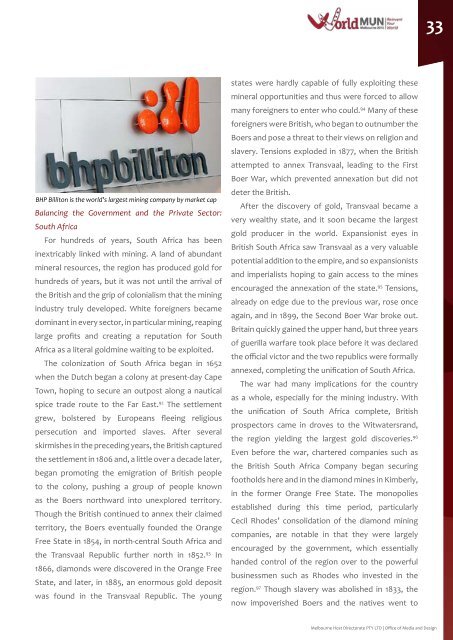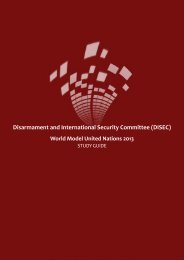SPECPOL - World Model United Nations
SPECPOL - World Model United Nations
SPECPOL - World Model United Nations
You also want an ePaper? Increase the reach of your titles
YUMPU automatically turns print PDFs into web optimized ePapers that Google loves.
BHP Billiton is the world’s largest mining company by market cap<br />
Balancing the Government and the Private Sector:<br />
South Africa<br />
For hundreds of years, South Africa has been<br />
inextricably linked with mining. A land of abundant<br />
mineral resources, the region has produced gold for<br />
hundreds of years, but it was not until the arrival of<br />
the British and the grip of colonialism that the mining<br />
industry truly developed. White foreigners became<br />
dominant in every sector, in particular mining, reaping<br />
large profits and creating a reputation for South<br />
Africa as a literal goldmine waiting to be exploited.<br />
The colonization of South Africa began in 1652<br />
when the Dutch began a colony at present-day Cape<br />
town, hoping to secure an outpost along a nautical<br />
spice trade route to the Far East. 92 the settlement<br />
grew, bolstered by Europeans fleeing religious<br />
persecution and imported slaves. After several<br />
skirmishes in the preceding years, the British captured<br />
the settlement in 1806 and, a little over a decade later,<br />
began promoting the emigration of British people<br />
to the colony, pushing a group of people known<br />
as the Boers northward into unexplored territory.<br />
though the British continued to annex their claimed<br />
territory, the Boers eventually founded the Orange<br />
Free State in 1854, in north-central South Africa and<br />
the Transvaal Republic further north in 1852. 93 in<br />
1866, diamonds were discovered in the Orange Free<br />
State, and later, in 1885, an enormous gold deposit<br />
was found in the Transvaal Republic. The young<br />
states were hardly capable of fully exploiting these<br />
mineral opportunities and thus were forced to allow<br />
many foreigners to enter who could. 94 Many of these<br />
foreigners were British, who began to outnumber the<br />
Boers and pose a threat to their views on religion and<br />
slavery. Tensions exploded in 1877, when the British<br />
attempted to annex Transvaal, leading to the First<br />
Boer War, which prevented annexation but did not<br />
deter the British.<br />
After the discovery of gold, Transvaal became a<br />
very wealthy state, and it soon became the largest<br />
gold producer in the world. expansionist eyes in<br />
British South Africa saw Transvaal as a very valuable<br />
potential addition to the empire, and so expansionists<br />
and imperialists hoping to gain access to the mines<br />
encouraged the annexation of the state. 95 tensions,<br />
already on edge due to the previous war, rose once<br />
again, and in 1899, the Second Boer War broke out.<br />
Britain quickly gained the upper hand, but three years<br />
of guerilla warfare took place before it was declared<br />
the official victor and the two republics were formally<br />
annexed, completing the unification of South Africa.<br />
the war had many implications for the country<br />
as a whole, especially for the mining industry. With<br />
the unification of South Africa complete, British<br />
prospectors came in droves to the Witwatersrand,<br />
the region yielding the largest gold discoveries. 96<br />
Even before the war, chartered companies such as<br />
the British South Africa Company began securing<br />
footholds here and in the diamond mines in Kimberly,<br />
in the former Orange Free State. The monopolies<br />
established during this time period, particularly<br />
Cecil Rhodes’ consolidation of the diamond mining<br />
companies, are notable in that they were largely<br />
encouraged by the government, which essentially<br />
handed control of the region over to the powerful<br />
businessmen such as Rhodes who invested in the<br />
region. 97 Though slavery was abolished in 1833, the<br />
now impoverished Boers and the natives went to<br />
33<br />
Melbourne Host Directorate PTY LTD | Office of Media and Design

















